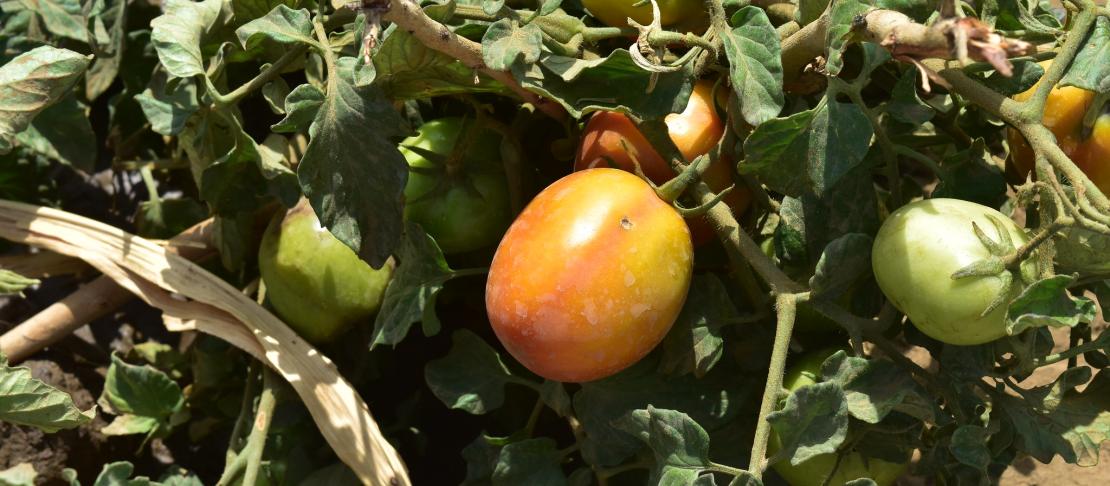Food System Adaptation in Changing Environments in Africa (FACE-Africa)

Food System Adaptation in Changing Environments in Africa | FACE Africa
Project description
Climate change exacerbates undernutrition mainly through the following causal pathways: (1) impacts on household access to sufficient, safe and adequate food; (2) impacts on care and feeding practices; and (3) impacts on environmental health and access to health services. Therefore, in addition to securing food, climate-smart agriculture (CSA) activities should aim to increase the demand for and understanding of nutritious diets. It should also facilitate the adoption of adaptive technologies to help boost agricultural income for nutrition, health, and education.
A new partnership of the CGIAR Research Program on Climate Change, Agriculture and Food Security (CCAFS) in West Africa with the London School of Hygiene and Tropical Medicine (LSHTM) is aiming to promote nutrition and health-focused research through a newly funded project on Food System Adaptation in Changing Environments in Africa (FACE-Africa).
The overall aims of the FACE Africa project are to: (1) develop tools to identify, synthesize and quantify the impact that tested adaptations in food systems will have on food availability, diversity and equality of access in climate vulnerable countries in Africa; and (2) assess the capacity of food systems in climate vulnerable countries to deliver healthy and sustainable diets by 2030. The project will include The Gambia as a case study to develop methods for similar analyses in other African countries.
Activities
- Analysis of the national-level data from publicly available sources
- Mapping and evidence synthesis of climate change adaptations identified in the ongoing CCAFS Climate-Smart Villages (CSV) approach
- Exploration of inequalities in the food system by bringing together sub-national data on nutrition and health previously collected from various sites by the Medical Research Council (MRC) in The Gambia and Cambridge
- Development of methods to quantify population nutritional status and health under business-as-usual (BAU) scenarios for 2030
- Stratification of the Gambian population into “consumption strata” based on dietary analysis conducted as part of outcome 1
- Comparison of future food system projections
- Use of mixed methods to identify future climate change adaptation scenarios, and their impact on nutritional and population health
Expected outcomes
- The food system in The Gambia along with its major trends and drivers, are characterized and synthesized;
- Evidence of past and current adaptations to climate change in food systems in The Gambia/West-Africa is mapped;
- A novel method to use national, regional, and local secondary datasets to parameterize and downscale existing environment / agriculture / nutrition and health models to provide estimates of the impacts of future food systems on population health by 2030, including The Gambia as a case study, is developed
- Alternative food system scenarios for 2030 based on climate adaptations already being considered for implementation in The Gambia are explored. Furthermore, opportunities through outcome 1 and outcome 2 are identified, and their impact on all-cause mortality/years of lost lives and all forms of malnutrition are estimated
CCAFS and the International Institute for Applied Systems Analysis (IIASA) will develop new scenarios and use previously developed Economic Community of West African States (ECOWAS) scenarios for West Africa that will be parameterized and downscaled for The Gambia.
Partners
- International Institute for Applied Systems Analysis (IIASA)
- The London School of Hygiene & Tropical Medicine (LSHTM)
- Medical Research Council (MRC)
- University of Cambridge
- CCAFS
More information
For more information, please contact Dr. Robert, Zougmoré, CCAFS/ICRISAT (r.zougmore@cgiar.org), Dr Pauline Scheelbeek, The London School of Hygiene & Tropical Medicine (Pauline.Scheelbeek@lshtm.ac.uk) and Rosemary Green, The London School of Hygiene & Tropical Medicine (Rosemary.Green@LSHTM.ac.uk).
Funding for this project is provided by:

Project Deliverables
Journal Article (peer reviewed)
An assessment of mobile phone-based dissemination of weather and market information in the Upper West Region of Ghana
Policy brief/policy note/briefing paper
Formulation of a Robust National Rural Sector Program in Burkina Faso: What new themes have emerged from the socio-economic and climate scenarios process?
Discussion paper/Working paper/White paper
Candidate fodder species for goat production in Northern Ghana
Journal Article (peer reviewed)
Developing climate-smart agriculture to face climatic variability and extremes in West Africa: challenges and lessons
Journal Article (peer reviewed)
Why promote improved fallows as a climate-smart agroforestry technology in Sub-Saharan Africa?
Policy brief/policy note/briefing paper
Uptake of Climate-Smart Agriculture in West Africa: What can we learn from climate-smart villages of Ghana, Mali and Niger?
Factsheet, Project Note
West Africa Climate-Smart Villages AR4D sites: 2016 Inventory
Concept note
Developing bankable proposals for submition to green climate funds
Policy brief/policy note/briefing paper
Climate-smart agriculture in Benin
Policy brief/policy note/briefing paper
Climate-smart agriculture in Niger
Policy brief/policy note/briefing paper
Climate-smart agriculture in Cote d'lvoire
Policy brief/policy note/briefing paper
Climate-smart agriculture in The Gambia
Book chapter
Climate information use implications for climate risk mitigation in West Africa
Book chapter
Adaptation Processes in Agriculture and Food Security: Insights from Evaluating Behavioral Changes in West Africa. In Evaluating Climate Change Action for Sustainable Development
Book chapter
Techniques traditionnelles de restauration de la productivité des sols dégradés en régions semi-arides d’Afrique occidentale
Funder report
Climate information services for increased resilience and productivity in Senegal (CINSERE): Annual Performance report
Journal Article (peer reviewed)
Farmers’ Willingness to Pay for Climate Information Services: Evidence from Cowpea and Sesame Producers in Northern Burkina Faso
Journal Article (peer reviewed)
Editorial for the Thematic Series in Agriculture & Food Security: Climate-Smart Agriculture Technologies in West Africa: learning from the ground AR4D experiences
Journal Article (peer reviewed)
Factors affecting uptake (use) of seasonal forecast information in northern Ghana – a gendered perspective
Discussion paper/Working paper/White paper
Documentation, nutritional profiling and testing of fodder trees or shrubs for climate-smart livestock production in West Africa
User manual/Technical Guide
Use of Climate Information in Mali-Technical Manual for Public and Private Rural Development Officers
Discussion paper/Working paper/White paper
Science-policy interactions for accelerated Climate-Smart Agriculture uptake: lessons learnt from West African national science-policy dialogue platforms
Thesis
Gender Differentiated Perception and Adaptation Strategies of Cowpea Growers to Climate Change and Variability in Segou Region, Mali
Journal Article (peer reviewed)
Facing climate variability in Sub-Saharan Africa: analysis of climate-smart agriculture opportunities and approaches to managing climate-related risks
Journal Article (peer reviewed)
Mapping regional livelihood benefits from local ecosystem services assessments in rural Sahel
Brochure
Artisanal Fisheries Weather Support (USAID / CINSERE training manual)
Journal Article (peer reviewed)
Assessment of Greenhouse Gas Emissions from Different Land-Use Systems: A Case Study of CO2 in the Southern Zone of Ghana
Journal Article (peer reviewed)
Assessment of Greenhouse Gas Emissions from Different Land-Use Systems: A Case Study of CO2 in the Southern Zone of Ghana
Brochure
Climate Products and Services (USAID / CINSERE training manual)
Brochure
Seasonal Precipitation Forecast (USAID / CINSERE training manual)
Journal Article (peer reviewed)
Facilitating Change for Climate-Smart Agriculture through Science-Policy Engagement
Brochure
Direct Reading Rainfall (USAID / CINSERE training manual)
Policy brief/policy note/briefing paper
Mainstreaming gender and social differentiation into CCAFS research activities in West Africa: lessons learned and perspectives
User manual/Technical Guide
Climate Change (USAID / CINSERE training manual)
Journal Article (peer reviewed)
Gender and climate risk management: evidence of climate information use in Ghana
Journal Article (peer reviewed)
Institutional Perspectives of Climate-Smart Agriculture: A Systematic Literature Review
User manual/Technical Guide
Methodological Guide: Participatory Community Method of Inventory and Prioritization of Climate-Smart Farming-Agroforestry Technologies / Practices in Agriculture
Journal Article (peer reviewed)
Farmers’ Willingness to Pay for Climate Information Services: Evidence from Cowpea and Sesame Producers in Northern Burkina Faso
Policy brief/policy note/briefing paper
Farmers' prioritization and adoption of climate-smart agriculture technologies and practices in Niger
Journal Article (peer reviewed)
Farmers' prioritisation and adoption of climate-smart agriculture technologies and practices in Senegal
Journal Article (peer reviewed)
Closing the Gap between Climate Information Producers and Users: Assessment of Needs and Uptake in Senegal
Thesis
Towards adaptation planning to climate change in the Sudanian zone of Mali: analysis of vulnerability and choice of adaptation options
Data paper
CCAFS midline synthesis report - Ghana
Thesis
Evaluating the Costs and Benefits of Climate-Smart Agriculture Technologies and Practices in Climate-Smart Villages in Kaffrine, Senegal
Policy brief/policy note/briefing paper
Climate-Smart Agriculture in Seychelles
Policy brief/policy note/briefing paper
A Public-private partnership model for scaling up climate information services (CIS) in Ghana
Journal Article (peer reviewed)
Factors influencing the access to and use of climate information services CIS for men and women farmers in Senegal
Journal Article (peer reviewed)
Science-policy interfaces for sustainable climatesmart agriculture uptake: lessons learnt from national science-policy dialogue platforms in West Africa
Policy brief/policy note/briefing paper
Le Projet d'Appui à la Résilience Climatique pour un Développement Agricole Durable (PARC-DAD) au Niger est-il suffisamment climato-intelligent ? Résultats-des-analyses-participatives-des-projets terrain du PARC-DAD au Niger
Policy brief/policy note/briefing paper
Assessing the Climate-Smartness of the West Africa Agricultural Productivity Programme (WAAPP): What can we learn from Benin, Guinea, Niger, Togo and Chad projects?
Policy brief/policy note/briefing paper
Scaling up climate information services through public-private partnership business models
Policy brief/policy note/briefing paper
Assessing the decisions taken following the reception of CIS to inform farming practices in Senegal
Journal Article (peer reviewed)
Science-policy interfaces for sustainable climatesmart agriculture uptake: lessons learnt from national science-policy dialogue platforms in West Africa
Journal Article (peer reviewed)
Uptake of Climate-Smart Agricultural Technologies and Practices: Actual and Potential Adoption Rates in the Climate-Smart Village Site of Mali
Journal Article (peer reviewed)
Factors influencing gendered access to climate information services for farming in Senegal
Journal Article (peer reviewed)
Applying an indirect method for estimating and modelling the aboveground biomass and carbon for wood energy in the arid ecosystems of Aϊr Tenéré of Niger
Journal Article (peer reviewed)
Perceived Climate Variability and Farm Level Adaptation in the Central River Region of The Gambia
Discussion paper/Working paper/White paper
Science-policy interactions for climate-smart agriculture uptake: lessons learnt from national science-policy dialogue platforms in West Africa
Journal Article (peer reviewed)
Contribution of systems thinking and complex adaptive system attributes to sustainable food production: Example from a climate-smart village
Policy brief/policy note/briefing paper
Climate-Smart Agriculture in Cabo Verde
Journal Article (peer reviewed)
Can Protection Motivation Theory Explain Farmers’ Adaptation to Climate Change Decision Making in The Gambia?
Policy brief/policy note/briefing paper
Climate-Smart Agriculture in Guinea-Bissau
Journal Article (peer reviewed)
Perceived Climate Variability and Farm Level Adaptation in the Central River Region of The Gambia
Policy brief/policy note/briefing paper
Climate-Smart Agriculture in Adamawa state of Nigeria
Policy brief/policy note/briefing paper
Climate-Smart Agriculture in Borno state of Nigeria
Policy brief/policy note/briefing paper
Climate-Smart Agriculture in Yobe state of Nigeria
Partners
- Alliance of Bioversity and CIAT - Headquarter (Bioversity International) (Bioversity (Alliance))
- Council for Scientific and Industrial Research
- Council for Scientific and Industrial Research - Animal Research Institute (CSIR-ARI)
- ESOKO Limited
- Food and Agriculture Organization of the United Nations (FAO)
- Institut de l’Environnement et de Recherches Agricoles (Burkina Faso) (INERA)
- Institut d’Economie Rurale (Mali) (IER)
- Institut National de la Recherche Agronomique du Niger (INRAN)
- Institut Senegalais de Recherche Agricole (ISRA)
- International Crops Research Institute for the Semi-Arid Tropics (ICRISAT)
- International Livestock Research Institute (ILRI)
- Ministère du Tourisme et des Transport aériens (Senegal)
- Savannah Agricultural Research Institute (SARI)